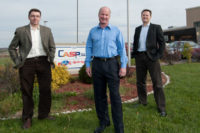
Smooth Operators
by James Dudlicek
Editor
Latest plant expansion helps YoCream take on new business.
Costco shoppers probably don’t know that tall swirl of frozen yogurt they’re enjoying at their local store comes from one nimble plant in the Pacific Northwest — a plant that keeps getting bigger to take on new business as the market expands for its varied product lines.
Earlier this year, YoCream International Inc. expanded
the manufacturing facility at its Portland, Ore., headquarters by nearly 40
percent, adding needed production and freezer space, a refrigerated
shipping dock with four truck bays and a new quality assurance lab.
The improvements enhance YoCream’s flexibility,
and hence its value to potential customers, says John Hanna, chief
executive officer and chairman of the board. “Operationally, we can
do a lot of things with this size facility, and respond quickly to
customers — an important combination,” Hanna says. “We
can develop proprietary products for our long-term customers with a
turnaround that’s rapid, and that gives us a significant
edge.”
The expansion will allow YoCream to more easily
deliver on its extensive line of dairy-based and non-dairy products,
including the newest additions — its Original Tart Frozen Yogurt and
Jarritos frozen beverages, patterned after the flavors of the popular
Mexican soft drink brand — as well as new flavors added to the Jolly
Rancher branded line of slushy drinks launched in 2005.
Local, Local, Local
Using resources that are close by is a growing trend
that seems to really thrive in the Northwest, and YoCream is no exception.
All of the raw milk used for the company’s frozen yogurt and ice
cream products comes from Oregon-based dairy producers and is offloaded,
after passing labs, into two receiving silos with a combined capacity of
20,000 gallons. Three other receiving tanks totaling more than 30,000
gallons take loads of three different types of sugar.
Recipes take shape in the blend tanks, where liquid
ingredients measured by gallons are combined before the mix is pasteurized.
From nine different pasteurized storage tanks, with a combined capacity of
more than 50,000 gallons, the mix goes to the flavor tanks, where specific
recipes are completed and sent to various lines all over the plant,
explains Issam Khouri, director of manufacturing operations.
In all, 13 flavor tanks ranging from 500 to 1,000
gallons contain the bases for various dairy, non-dairy and fruit-based
treats. Khouri notes that all processing functions are computer controlled
and accessible at touch-screen computer workstations.
Among the plant’s manufacturing lines is an
aseptic web filler for non-dairy products, added in 2003. Used to fill
plastic bags of mix for foodservice beverage machines, this equipment is
expected to be adapted for low-acid use in the near future, Khouri says.
“We’re getting a lot of requests for low-acid products,”
he explains. “When we designed the system, we made it adaptable, so
right now we’re in the planning stage of modifying the
system.”
Packaging used on this filler must be 100 percent
sterile, Khouri stresses. To accomplish this, boxes filled with plastic
bags are irradiated for purity. Each box is marked with a dot that’s
chemically treated to change color, to indicate that the sterilization
process was successful.
On the product side, an aseptic sterilizer heats
product up to 290 degrees F from the inside and outside in a triple-tube
system to ensure all inclusions are heated. Cultured products, of course,
are not packaged aseptically because the sterilization process would
destroy the live and active cultures.
Meanwhile, two form-fill-seal machines handle
gable-top cartons of ice cream and yogurt mixes of various quantities.
Yogurt mix is filled in a liquid state, then frozen for shipment, to be
thawed by the end user.
Many of those cartons of mix coming off the line carry
the Kirkland brand name, since the Costco warehouse club store chain, based
near Seattle, uses YoCream’s yogurt exclusively at the foodservice
level in all its stores nationwide. “We believe our extremely
high-quality real frozen yogurt and intense customer service has enabled us
to remain an exclusive supplier,” says Matt Hanna, director of
administration and custom manufacturing, explaining that YoCream’s
high culture count and quality is what sold Costco on the product.
“Our relationship goes back almost 19 years.”
Another area features what Khouri calls a
“novelty line” that packages ready-to-eat products in 4- and
8-ounce cups as well as pints. Products made here include a
yogurt-and-fruit smoothie-type product packaged in a paper carton, shipped
frozen and thawed at point of sale. The line also churns out frozen yogurt
and ice cream treats in plastic cups.
Meanwhile, in the production area of the new
expansion, line operators tend to the Jolly Rancher product, filling the
vividly colored mixture into plastic bags ranging from a half gallon to 5
gallons. Manually operated in part, this line is slated to be fully
automated soon, Hanna says. “Eventually we’ll do other dairy
products in this new area as well,” he adds. “The availability
of unused square footage of quality production space is attracting new
custom manufacturing business that will provide additional
throughput.”
Evolution
Manufacturing has come a long way over the past three
decades at YoCream. In fact, for the first third of its history, the
company didn’t do its own manufacturing, and then started small.
Since it was built in 1987, the plant has gone through
at least two major expansions, the previous one in 1999. “We tore
down the whole production room from floor to ceiling,” Khouri says of
the project that included new tanks, fillers and computerized process
control. “It was a completely new design.”
Completed earlier this year, the latest
21,000-square-foot addition added 7,000 square feet of production space,
10,600 square feet of freezer storage (for a total of 22,000 square feet,
or 1,500 pallet spaces, enough room to hold 3.5 million pounds of finished
goods), a 3,400-square-foot refrigerated shipping dock with four truck bays
and a new QA lab.
“What pleased me during our expansion was,
throughout that whole period, we kept things running efficiently,”
Hanna says. “We didn’t short any customers. I applaud our
people for accomplishing that. A lot of companies, when they go through the
size expansion that we did, have difficulty functioning. We didn’t
miss a day of production.”
Also added over time: More raw and pasteurized
ingredient storage, including a 15,000-gallon silo just to hold the sugar
unique to the Jolly Rancher line.
While YoCream relies on third-party shippers rather
than its own truck fleet, the new shipping dock has done wonders for
product flow. Furthermore, the new storage space has allowed the company to
bring home product that had been stored offsite in leased space.
“It’s made our life a lot easier, and we reduced costs by
bringing a lot of product back in from outside storage,” Khouri says.
While some smaller batches of product are still stored
at other locations, “all full-truckload orders come out of
here,” Hanna notes, including all Kirkland products bound for Costco.
The cooler is made up of three separate rooms,
including a flash freezer, Khouri says. As an energy-saving tactic, the
climate in the latter room is monitored to save energy, he explains; when
products are hardened, they are moved to another room in order to minimize
use of wind chill-inducing fans.
QA and R&D
YoCream’s Food Safety and Quality Assurance
Department ensures that the most stringent levels of regulatory compliance
are maintained, meeting and exceeded all local, state, federal and
customer audits. The plant enjoys organic and kosher certification.
The company performs nearly all of its own lab testing
in house, including yeast, mold, coliform, shelf life and ESL incubation.
The only exception is pathogen testing. “We don’t want to take
a chance of a pathogen infecting the other products,” Khouri says.
Processing machinery must be cleaned and sterilized
each day before use. In fact, the control systems are programmed not to
work unless the sterilization process is completed.
“Every morning you have to sterilize it for a
half-hour,” Khouri says. “If it’s not sterilized, it
won’t let you do anything.”
In addition to the required hard copies, processing
data is stores electronically for several years to assist with traceability
in the event of a recall or other problem.
Meanwhile, YoCream’s manufacturing processes are
complemented by a fully staffed on-site research and development
department. The company develops all of its own new products, and offers
R&D services to customers as part of its custom manufacturing business.
So in two decades, YoCream has developed a
manufacturing infrastructure with the versatility and flexibility to take
on diverse new projects while never skipping a beat with its own extensive
product line. And with a growing interest in probiotics portending parallel
growth in frozen yogurt, the company is well positioned to meet increased
demand for better-for-you indulgent treats.
YOCREAM INTERNATIONAL
PLANT At A Glance
PLANT At A Glance
Location: Portland, Ore.
Year opened: 1987
Size: 75,750 square
feet
Employees: 71
Products made: Frozen yogurt, soft-serve mixes, ice cream, frozen custard,
sorbet, ices, chilled juices, smoothies, coffee drinks, soy products.
Processing capacity: Up
to a half-million pounds in an 8-hour shift.
HTST: Two at 30,000
pounds per hour.
Filling lines: Half-gallon gable-top, ESL gable-top (8, 10, 16, 32 ounces),
hard pack, aseptic and fresh bag-in-box, frozen beverage syrup.
Storage: 22,000 square
feet freezer/cooler.
$OMN_arttitle="Smooth Operators";?>
$OMN_artauthor="James Dudlicek";?>
